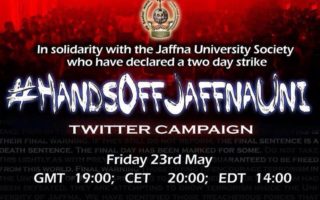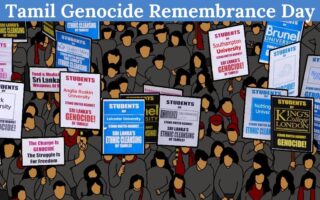The United Nations Human Rights Council’s (UNHRC) 2nd Universal Periodic Review (UPR) of Sri Lanka formally concluded on Monday the 5th of November 2012, with the outcome once again confirming the urgent need for drastic action to force Sri Lanka to abide by its human rights obligations.
Sri Lanka has rejected outright 100 out of 210 recommendations made at the UPR. These included those made by a number of countries calling for the implementation of recommendations from Sri Lanka’s very own flawed LLRC report, as well as those made by the more credible UN Panel of Experts’ report.
Although TYO-UK welcomes some of the effective recommendations made by countries, including the calls for accountability for war crimes and for ratification of the Rome Statute of the International Criminal Court, many of the recommendations lacked the required strength to effect tangible change on the island.
Nearly all of the recommendations fail to take into account the ethnic nature of the conflict that continues to blight the Tamil people to this very day. What remains unchanged is that it is Tamils who suffer the consequences of the “time and space” that was requested by Sri Lanka, and granted by the international community.
“Most recommendations ignored the fact that it was Tamils who bore, and still bear, the overwhelming brunt of the Sri Lankan government’s abusive conduct,” said Thusiyan Nandakumar, who was leading TYO-UK’s Human Rights delegation in Geneva.
“Sri Lanka deliberately stalled implementing the 2008 recommendations, and this was ignored in most of the statements made by the 99 participating countries.”
Only 2 of the 26 commitments voluntarily made by Sri Lanka in 2008 were implemented and out of 45 accepted recommendations only 5 were implemented.
It is this flawed, subdued approach and lack of stern action that has made it too easy for Sri Lanka to falsify promises, whilst simultaneously committing human rights violations, over several decades.
This review has proven once again that Sri Lanka is resolute only in its obstinacy to continue on its path of impunity. However the UNHRC has continued to reward Sri Lanka with more “time and space”, in a futile hope that the country will reform.
Meanwhile, land grabs in the traditional Tamil homeland continue unabated, whilst heavy militarisation of civilian life is stifling all attempts at dissent by the Tamil people. Recommendations to address abductions and the fate of detainees have invariably been rejected by Sri Lanka, and the country continues its blatant disregard to international human rights norms putting the potency of the UPR process, and the UNHRC, into question.
“The only way to force Sri Lanka’s commitment to human rights and effect positive change for the island’s inhabitants is through strong action by the international community, including by the UN,” said Mr Nandakumar.
Sri Lanka has been allowed to dodge its obligations and deceive the international community for far too long. This farce can no longer be allowed to continue. The time for strong decisive action from the United Nations and international community to act and end Sri Lanka’s cycle of impunity is long overdue.


